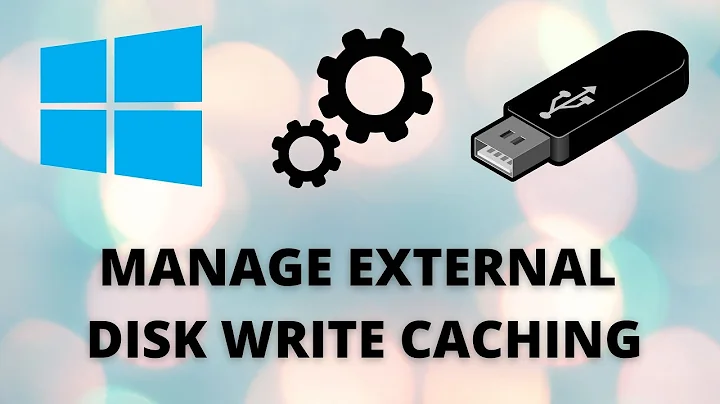Is "Turn Off Windows write-cache buffer flushing" safe on a laptop?
Solution 1
Yes it is safe. Windows never uses up all of the battery power. When the battery level reaches a certain minimum (~6-7%), it automatically flushes drive caches and hibernates. It does this before the battery level is too low to hibernate which requires a certain amount of “juice” to spin the hard-drive long enough to copy the RAM to disk.
Solution 2
Power loss is not the only thing that causes a system to physically fail. On laptops, it's easy to spill drinks in keyboards, drop them down stairs, and various other dangers while the disk is spinning. Anything that disables the hard drive suddenly is going to be a little safer with write caching enabled. I suggest leaving it enabled.
Solution 3
Emprically, I have had to reinstall windows 3 times on 2 separate laptops using this setting. Never had to do this when it is not set. Had the laptops 4 years and 1 years, probably ran than about 50% with setting 50% without. Currently without. Not enough data to prove anything QED but enough to convince me that the grief involved in proving the above was coincidence is not worth the benefit of the performance boost, I definitely would not use it on a system drive.
Related videos on Youtube
The_g U r U
Hello there! My name's Jordan Earls, but most people online know me as "earlz". I'm the lead developer and a co-founder of the Qtum project which brings the Ethereum Virtual Machine (ie, the thing that makes Solidity contracts function) to a UTXO based blockchain similar to Bitcoin. I've been programming since I was 13 and am completely self-taught. Low-level code like assembly and pointer arithmetic is the fun stuff for me. I also make music when I have time even though it's usually awful. Most of my personal projects are open source and BSD licensed. The majority of them are at bitbucket with the rest of them being listed on github Also, you can follow me on the twitters @earlzdotnet
Updated on September 18, 2022Comments
-
The_g U r U almost 2 years
my laptop's internal harddrive is a bit slow. I looked at the drive properties and there are two options:
[X] Enable write caching on the device [ ] Turn off windows write-cache buffer flushing on the device
As you can see, the first option is checked already, but the second option isn't. I've heard the second option can really speed things up, but it also sounds very risky. Is it safe to do on a laptop that rarely is off of AC power? (but still has battery as well)
-
 Moab almost 12 yearsBad idea, potential data loss if the laptop does a spontaneous restart or crash.
Moab almost 12 yearsBad idea, potential data loss if the laptop does a spontaneous restart or crash. -
Synetech almost 12 years> Bad idea, potential data loss if the laptop does a spontaneous restart or crash. @Moab, that could be said of desktops as well, yet internal drives are usually set to be as fast as possible. The question isn’t about data loss due to crashes, but power-loss (which technically, a laptop is better off than a desktop because its battery is like a built-in UPS).
-



![How to Enable or Disable Disk Write Caching In Windows 10/8/7 [Tutorial]](https://i.ytimg.com/vi/680rz9kHdMQ/hqdefault.jpg?sqp=-oaymwEcCOADEI4CSFXyq4qpAw4IARUAAIhCGAFwAcABBg==&rs=AOn4CLAb_mSNNIhB4CHOeZ_VPrVOwFVWvQ)
